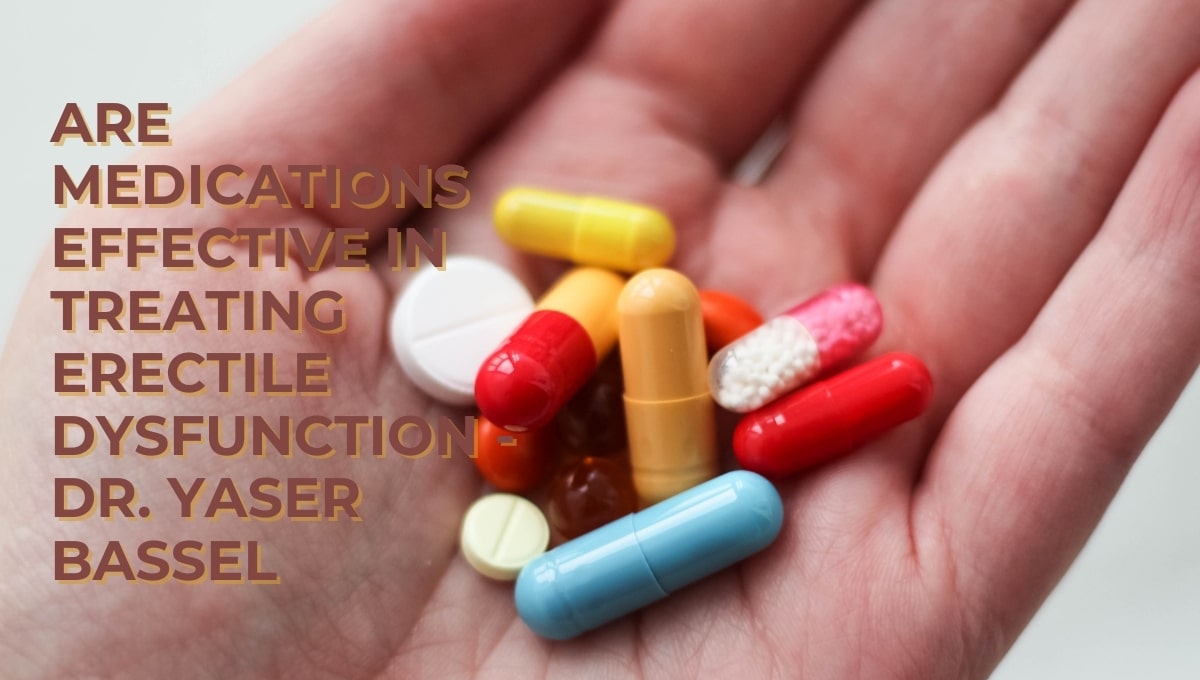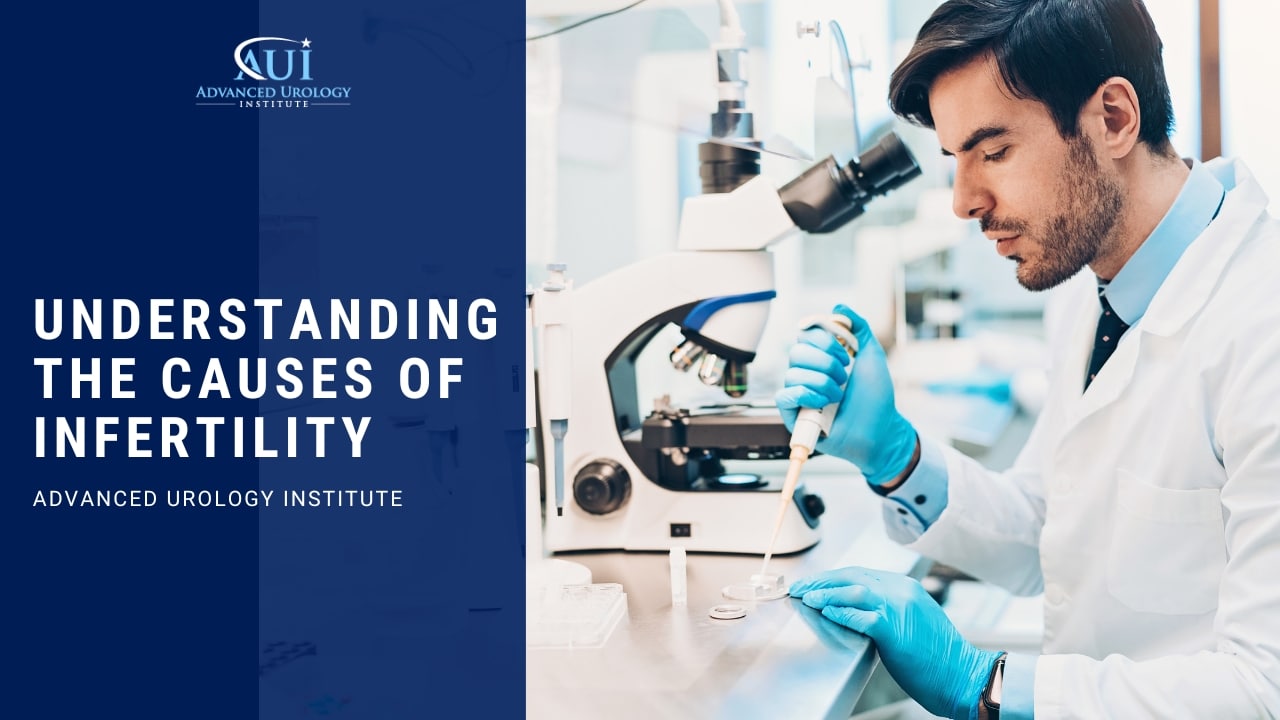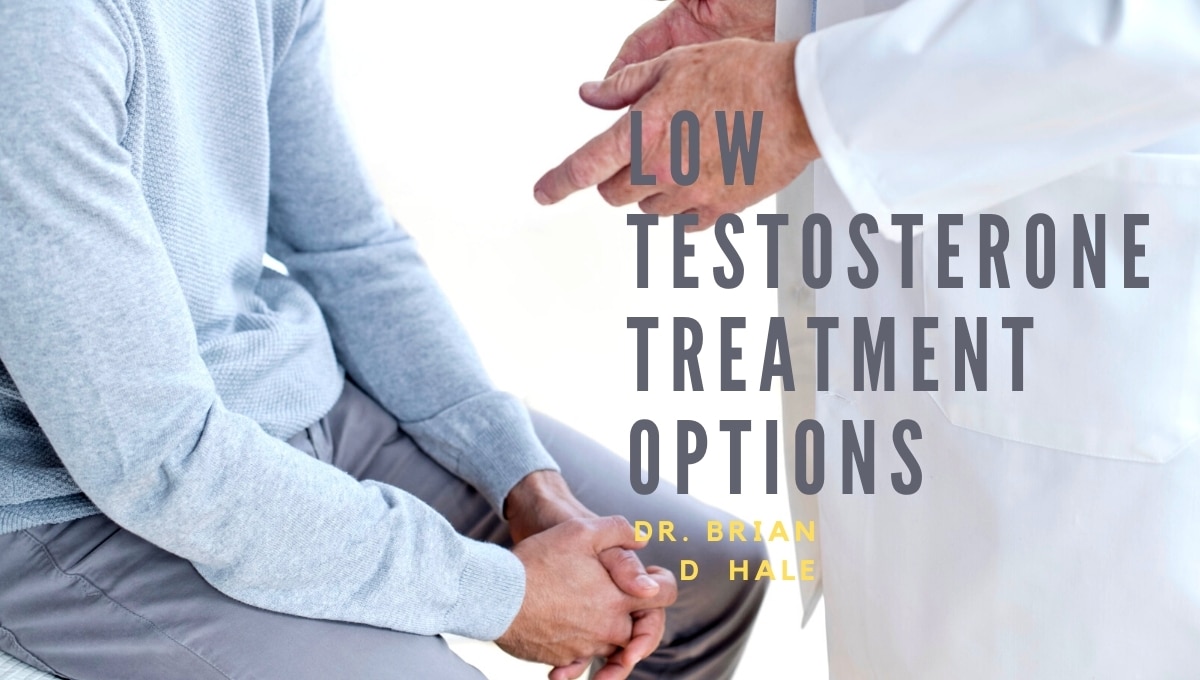Understanding of the challenges of male infertility and what are the solutions can help you maintain an active and health lifestyle.
Continue readingUnderstanding The Causes of Infertility
Infertility can be a frustrating and emotionally challenging experience for couples trying to conceive. The causes of infertility can be attributed to health problems, environmental factors, or lifestyle choices.
Continue readingWhat Should You Discuss with Your Doctor about Erectile Dysfunction, According to Dr. Yaser Bassel?
Low Testosterone Treatment Options
 My name is Brian Hale. I’m a board certified urologist working with Advanced Urology Institute.
My name is Brian Hale. I’m a board certified urologist working with Advanced Urology Institute.
Men with low testosterone are often treated in our practice, and we have several options in treating it: We have injections that we do every two to three (2-3) weeks, and we also have gels that they can put on their skin every morning to raise their testosterone levels back to normal levels. We even have pellets we put on the skin of some patients that we do every four (4) months. We have different options depending on what the patient wants done.
If you are in need of a consultation or have any questions, visit us at our Tampa, FL office or call us at (813) 749-0820.
Are Medications Effective in Treating Erectile Dysfunction – Dr. Yaser Bassel
My name is Yaser Bassel, I am a board-certified urologist with Advanced Urology Institute.
 I would say the vast majority of them, especially if they have not tried medications prior to them being seen in our office, probably 70-80 percent of those men will at least have a response to the medication oftentimes enough to basically be satisfactory to the patient or make them pleased with the way the medication is working. So most of them would actually get a good response to the medication.
I would say the vast majority of them, especially if they have not tried medications prior to them being seen in our office, probably 70-80 percent of those men will at least have a response to the medication oftentimes enough to basically be satisfactory to the patient or make them pleased with the way the medication is working. So most of them would actually get a good response to the medication.
Are there other treatment options for ED?
As far as what we have available to us now and what’s on the forefront, [for] those patients that do not want medication there are some newer technologies that are available that utilize shockwave energy to try and create newer vascularity in order to get a better response for that medication and that is something that’s basically come out over the past couple of years that we are starting to utilize in our practice. For those that do not respond to medication and still want to have treatment, the next step oftentimes [is] performing a test called a Penile Doppler where we will inject the penis with a vasoactive medication which will then initiate an erection so that we can measure blood flow and also measure for a venous leak which are two reasons why patients can have issues with erectile dysfunction.
If you are in need of a consultation or have any questions, visit us at our Tampa, FL office or call us at (813) 749-0820.
What is the impact of low testosterone on men according to Dr. Samuel Lawindy?
Ways to Treat Erectile Dysfunction
If you suspect that you have erectile dysfunction, you need to talk to your doctor about it. Then you can work with the doctor to determine the underlying factor or cause of the condition. Actually, ED can only be effectively treated if what is causing it is known. In fact, you may find that your condition improves with only simple lifestyle changes, such as losing weight, quitting smoking or drinking less alcohol. And if it is a medication you’re taking that is causing the problem, your doctor may treat the condition by reducing the dosage or having you try another drug.The treatment options for ED include lifestyle changes, counseling, medications, penile injections, vacuum pumps and surgery.
1. Lifestyle changes
Making lifestyle changes can reduce the severity or improve erectile dysfunction. Some of the changes are:
a. Quitting smoking
b. Stopping or reducing alcohol consumption
c. Increasing physical activity or exercise
d. Cutting down body weight
e. Stopping the use of illegal drugs
2. Seeing a counselor
Your urologist may recommend that you see a counselor if your erectile dysfunction is worsened by psychological or emotional issues. In many cases, counselors require that you go with your partner to the counseling sessions so she can know how best to support you. And as you work on the anxiety and stress issues with your counselor, your urologist will be focused on treating any underlying physical issues. Usually only a handful of sessions with the counselor will be enough for you to overcome ED.
3. Medication
The first treatment that your urologist will offer to treat ED is oral pills. Common oral medications for ED include:
a. Sildenafil (Viagra)
b. Tadalafil (Cialis)
c. Vardenafil (Levitra or Staxyn)
d. Avanafil (Stendra).
These medicines work by relaxing your smooth muscles and increasing blood supply to the penis following sexual stimulation. You’ll be required to take them anywhere from 15 minutes to 36 hours before sex, depending on the particular drug your doctor has prescribed. Vardenafil (Staxyn) dissolves in the mouth, but the other pills are swallowed. However, you aren’t allowed to take any of these drugs more than once per day. The drugs are effective in about 80 percent of men who use them, although if you have an erection that lasts beyond 4 hours, you should seek emergency medical help.
You should not take these medicines as treatment for ED if you are already taking nitrates for a heart disorder. Since nitrates also relax and widen blood vessels, their combination with these drugs leads to a sudden reduction of your blood pressure, which may cause falling, fainting or dizziness and possible injuries. Likewise, if you are already taking drugs to treat enlarged prostate (BPH), inform your doctor about them. A combination of BPH medications called alpha-blockers with ED medicines also may result in sudden reduction of your blood pressure.
In case your erectile dysfunction is due to low testosterone levels, the urologist may prescribe testosterone. However, testosterone therapy won’t work for you if you have nerve or circulatory problems. So you must be very open with your urologist about your other medical problems before you are given any medications.
4. Penile injections
Injecting the penis with a drug called alprostadil can trigger a stronger and firmer erection. While oral medications are able to cause an erection after sexual stimulation, you can’t get an automatic erection with them. That’s why your doctor may at times opt for injecting a drug into the penis to ensure you achieve erection automatically even without sexual stimulation.
5. Vacuum constriction devices (pumps)
Vacuum pumps pull blood into the penis, resulting in an erection. A typical vacuum device is an external pump supplied with a band that you can use to achieve and maintain an erection. According to several studies, up to 50-80 percent of men who have used vacuum erection devices are pleased with the results.
A vacuum device has three components:
a. A plastic tube (cylinder), which you place toward the end of your penis.
b. A pump, which drives out air from the tube in order to create a vacuum.
c. An elastic ring (band), which you place on the cylinder, on the other end applied to your body, and then move it from the tube to the penis in order to maintain erection.
To use the vacuum erection device, you place the pump over your penis and pump out air from the tube (cylinder) to create a vacuum. The vacuum then pulls blood into the penis’ shaft and makes the penis longer and firmer. Once the penis is erect, and with the help of a lubricant, you slide the retaining band downward onto the lower end of your penis. You also remove the pump once you have released the vacuum.
The elastic ring sustains the erection by stopping blood from moving back into the body during intercourse. So you can only attempt intercourse with the elastic ring in place. And the ring can be left in place for about 30 minutes to enable successful intercourse.
6. Penile prosthesis (Penile implant surgery)
Another option for treating ED is penile prosthesis in which your urologist performs an operation to implant either a malleable (bendable) device or inflatable device into your penis. A penile implant surgery is preferred when you have an obvious medical condition that is causing the ED and the urologist is sure that your condition won’t resolve naturally or with medications.
Usually, the simplest form of penile prosthesis is surgical implantation of malleable rods inside the erection chambers of your penis. Once implanted, the rods ensure that your penis is maintained in semi-rigid state and just requires lifting or adjusting to erect position for sexual intercourse. Malleable rods are a good option if you’ve had spinal injury or have limited hand strength.
Alternatively, your doctor may go for a hydraulic, inflatable implant. With this prosthesis, you can choose to get an erection when you need to. Inflatable implants increase the size of the penis through a pump that’s located in the scrotum. The advantage of an inflatable implant over malleable rods is that the erection is more natural and easier to conceal than one achieved with malleable rods.
Penile implant surgery takes about one hour to complete and is usually performed in an outpatient setting. Following penile implant surgery, you’ll be able to leave the hospital the same day after surgery and can resume sexual intercourse 4-6 weeks after the procedure.
7. Artery reconstruction (Vascular reconstructive surgery)
Artery reconstruction is often a last resort treatment for ED because the procedure is costly, technically difficult and does not usually work. But the aim of the procedure, when recommended, is to boost blood flow in your penis and help you achieve an erection. During the operation, the urologist transfers an artery in another part of your body (usually from a muscle in the belly) to one in your penis, creating a path for blood to move around the blocked (affected) area. The procedure is only rarely considered, but may be an option for men younger than 30 who have ED because of injuries to their penis or the area around it.
Want to find out more about erectile dysfunction? Visit the “Advanced Urology Institute” site.
What is an Erectile Dysfunction? with Dr. James E. Renehan
Erectile dysfunction (ED) is a man’s inability or difficulty to get or keep erections that are firm enough to enable sexual intercourse.
While occasional ED is very common in men, particularly during times of stress, depression or fatigue, frequent ED can really ruin a man’s life. For instance, some men with erectile dysfunction may avoid contact with their partners for fear that they will have trouble satisfying them sexually in the bedroom while others may get into a complete emotional and psychological meltdown.
Forms of erectile dysfunction
According to Dr. James E. Renehan of Advanced Urology Institute, erectile dysfunction can take a variety of forms. For example, some men may be unable to get an erection under any circumstance, while other men with ED may occasionally get an erection. In other men, getting an erection is possible but the erections are not strong enough for satisfying sexual intercourse.
“Erectile dysfunction does not mean that you are infertile,” says Dr. Renehan. “In fact, the majority of the men having difficulties with getting an erection are still quite capable of achieving an orgasm and getting children. ED just means that you cannot consistently get or sustain an erection.”
What are the symptoms of erectile dysfunction?
You could be suffering from ED if you frequently have:
- Difficulty getting an erection.
- Trouble sustaining an erection throughout sexual intercourse or during sexual activities.
- Diminished interest in sex.
However, there are also a number of factors related to erectile dysfunction, such as:
- Premature ejaculation.
- Difficulty achieving orgasm even after ample stimulation (anorgasmia).
- Delayed ejaculation.
Experiencing such symptoms for 2 or more months may indicate that you have erectile dysfunction. So it is important to speak with your urologist to determine if you have a sexual disorder.
“Men should know that erectile dysfunction is not in the head,” says Dr. Renehan. “You will not simply get an erection by stimulation, as 80 percent of all cases of ED are usually caused by treatable physical disorders, such as high blood pressure, high cholesterol or diabetes. So make sure you visit your doctor for advice.”
Causes of erectile dysfunction
Erectile dysfunction may have several possible causes, including both physical disorders and emotional problems. The most common causes are:
- Diabetes
- Obesity (being overweight)
- Smoking, alcohol use or drug abuse
- Hypertension
- Cardiovascular disease
- Hyperlipidemia
- Injuries
- Stress, anxiety or relationship problems
- Damage from surgery or cancer treatment
- Increased age
Because there are many possible causes of erectile dysfunction, it is important to work with a urologist so that any underlying medical conditions are identified and treated.
Diagnosis of erectile dysfunction
When you visit your urologist, you will be asked questions related to your symptoms, health history, emotional and physical problems. You also should expect a physical examination in which the doctor will listen to your lungs and heart, examine your penis and testicles and measure your blood pressure. The doctor may order various tests to determine whether you have an underlying disorder, such as blood and urine tests. A rectal examination may be requested to check your prostate.
Treatment of erectile dysfunction
The treatment chosen by your doctor will depend on the type of symptoms and any underlying causes for the dysfunction. At times, a combination of treatments may be necessary. The most common treatments for ED include:
- Medications: The doctor may prescribe medications to improve blood flow to the penis and improve ED symptoms. The drugs commonly indicated include Alprostadil (Caverject), Avanafil (Stendra), Sildenafil (Viagra), Tadalafil (Cialis), Testosterone (Androderm) and Vardenafil (Levitra).
- Talk Therapy: If it is established that the erectile dysfunction is caused by psychological factors such as stress, depression, anxiety or post-traumatic stress disorder, the urologist may recommend that you see a therapist. Working with the therapist, you will attend several sessions in which you will be helped to recover from stress, anxiety, subconscious conflict or negative feelings around sex. A relationship counselor also may be called upon if the ED is affecting your relationship.
- Alternative Treatments: Treatments such as prostatic massage, acupuncture, yoga and pelvic floor exercises also may improve your condition. Likewise, lifestyle and diet changes, such as regular exercise, losing weight, lowering your blood pressure and avoiding cigarettes and alcohol can be recommended to help you overcome erectile dysfunction.
- Surgery: When medications and exercises fail to work, the urologist may perform a surgery to correct any problems in the penis or to add a penile implant. Penile implants help to generate spontaneous and controlled erections.
Erectile dysfunction is treatable
Most cases of erectile dysfunction are treatable. At Advanced Urology Institute, we have helped thousands of men to improve their symptoms and regain their confidence through compassionate, multidisciplinary, patient-centered treatment approaches. Depending on your condition, we will administer the right medications or treatments to ensure that you achieve an erection and be able to have satisfying sexual intercourse. Come and discuss your symptoms with us so we can fix your problem. For more information on help with erectile dysfunction, visit the “Advanced Urology Institute” site.
Why Walnuts Make Men More Fertile
Are you a man struggling to have children and looking for a way to boost your fertility? If so, consider eating a handful of walnuts every day. According to a study conducted by the University of Delaware, eating a walnut-enriched diet boosts sperm quality and aids in preventing male infertility. Working with two groups of mice, one fed on a walnut-enriched diet and the other fed on a control diet for 9 weeks, the researchers found that the group fed walnuts had a significant improvement in sperm quality.
How Do Walnuts Work?
Walnuts reduce lipid peroxidation, a form of cell damage that interferes with sperm membranes and harms sperm cells. Sperm is made of polyunsaturated fatty acids which are liable to damage by lipid peroxidation. Walnuts are the only tree nut made of mostly polyunsaturated fatty acids and will therefore effectively replenish sperm cells. In fact, just 1 ounce of walnuts contains 13 grams of polyunsaturated fatty acids (PUFAs) in 18 grams of total fat. By preventing sperm damage and replenishing sperm cells, walnuts help to improve sperm morphology, motility and vitality.
First Study on Walnut Efficacy
The study by the University of Delaware was based on a previous study by the UCLA Fielding School of Public Health and School of Nursing. According to the first study, which was based on a randomized control trial at UCLA, eating 2.5 ounces of walnuts each day (about 30 walnut halves) significantly improves the motility, morphology and vitality of sperm in men. During the research, more than 100 healthy young men eating their usual Western-style diet participated in monthly calls to share what they ate throughout the study. At the end of the study, it was clear that walnuts improved sperm quality, though more research was necessary to verify the role of the nuts.
Second Research Study by the University of Delaware
When the University of Delaware conducted its study, it was designed to reveal the mechanism by which walnuts had improved sperm quality in the UCLA study. Two groups of male mice, one consisting of healthy male mice and the other of genetically predetermined infertile male mice, were fed on either a walnut-enriched diet or a controlled diet for 9 to 11 weeks. At the end of the study, significant improvements in sperm morphology and motility were observed in mice consuming 20% of their daily calories from walnuts (equivalent to 2.5 ounces daily in humans). Most interestingly, even infertile mice had a remarkable boost in sperm morphology and both groups showed noteworthy reduction in peroxidative damage. The researchers concluded that walnuts improve sperm quality by reducing peroxidative sperm cell damage, though recommending further studies to determine which specific nutrients in walnuts are responsible for this improvement.
Walnuts are Beneficial for Sperm Health
Fertility in men is determined largely by sperm quality and quantity. For instance, if the number of sperm ejaculated is very low or the sperm are of poor quality, it may be difficult or even unlikely for pregnancy to occur. Since one-in-five infertility cases are solely due to the male partner and about one-in-twenty men suffer from some form of fertility problem related to low numbers of sperm ejaculated, using a healthy and proven method of improving sperm morphology, vitality and motility is a good way to begin addressing fertility problems. Enriching your diet with walnuts can be an effective first step in resolving your fertility issues and, if needed, there are many other treatments for infertility using medications or surgery. For more information on dealing with male infertility, visit Advanced Urology Institute.







 1. Reduced Sex Drive
1. Reduced Sex Drive
